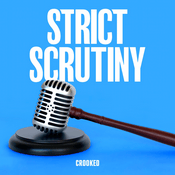337 episodios
- Secretary of State Marco Rubio testified before the Senate to defend the U.S. seizure of Venezuela's president—and his answers raised more questions than they settled. This episode features highlights from the testimony, discussion of possible further military action, and an examination of the Trump administration's efforts to reshape and control Venezuela's oil sector and contracts. View the show notes on our website at https://congressionaldish.com/cd332-controlling-venezuela Please Support Congressional Dish – Quick Links Contribute monthly or a lump sum via PayPal Support Congressional Dish via Patreon (donations per episode) Send Zelle payments to: [email protected] Send Venmo payments to: @Jennifer-Briney Send Cash App payments to: $CongressionalDish or [email protected] Use your bank's online bill pay function to mail contributions to: 5753 Hwy 85 North, Number 4576, Crestview, FL 32536. Please make checks payable to Congressional Dish Thank you for supporting truly independent media! Contact Your Members of Congress: (202) 224-3121
- This episode breaks down major provisions of the newly passed National Defense Authorization Act, including how Congress quietly weakened air-traffic safety rules, expanded counter-drone authorities for law enforcement, loosened protections against toxic "forever chemicals" for firefighters, and repealed outdated Iraq war authorizations while leaving broader war powers intact. It also covers new laws affecting taxes, veterans, and public lands, Trump's vetoes of bipartisan bills, and a wave of confirmations placing industry-connected figures in powerful regulatory and defense roles. View the show notes on our website at https://congressionaldish.com/cd331-december-2025-authorizing-future-disasters Please Support Congressional Dish – Quick Links Contribute monthly or a lump sum via PayPal Support Congressional Dish via Patreon (donations per episode) Send Zelle payments to: [email protected] Send Venmo payments to: @Jennifer-Briney Send Cash App payments to: $CongressionalDish or [email protected] Use your bank's online bill pay function to mail contributions to: 5753 Hwy 85 North, Number 4576, Crestview, FL 32536. Please make checks payable to Congressional Dish Thank you for supporting truly independent media! Contact Your Members of Congress: (202) 224-3121
- Special Prosecutor Jack Smith gave a closed-door, eight-hour deposition to the House Judiciary Committee that was later—surprisingly—made public. In this episode, hear highlights from his testimony about the investigation into Donald Trump's efforts to overturn the 2020 election, including the fake electors scheme, key prosecutorial decisions, and why members of Congress chose to scrutinize the investigation rather than the alleged crimes. View the show notes on our website at https://congressionaldish.com/cd330-prosecutor-jack-smiths-deposition Please Support Congressional Dish – Quick Links Contribute monthly or a lump sum via PayPal Support Congressional Dish via Patreon (donations per episode) Send Zelle payments to: [email protected] Send Venmo payments to: @Jennifer-Briney Send Cash App payments to: $CongressionalDish or [email protected] Use your bank's online bill pay function to mail contributions to: 5753 Hwy 85 North, Number 4576, Crestview, FL 32536. Please make checks payable to Congressional Dish Thank you for supporting truly independent media!
- In this episode, hear testimony that Republican leadership refused to make part of the official Congressional Record—stories from U.S. citizens who were violently arrested and jailed by agents of the Department of Homeland Security, often while clearly identifying themselves as Americans. This is not rhetoric, speculation, or partisan spin; it is sworn testimony, backed by a Senate investigation, and it raises a terrifying question: if this can happen to them, what stops it from happening to any of us? View the show notes on our website at https://congressionaldish.com/cd329-citizens-detained Please Support Congressional Dish – Quick Links Contribute monthly or a lump sum via PayPal Support Congressional Dish via Patreon (donations per episode) Send Zelle payments to: [email protected] Send Venmo payments to: @Jennifer-Briney Send Cash App payments to: $CongressionalDish or [email protected] Use your bank's online bill pay function to mail contributions to: 5753 Hwy 85 North, Number 4576, Crestview, FL 32536. Please make checks payable to Congressional Dish Thank you for supporting truly independent media!
- In this two-topic episode, we break down what became law in November—including the shutdown deal that reopened the government and the dingleberries that were quietly slipped into it. Then we revisit the hearing on the firing of the CDC Director, focusing on a politicized vaccine advisory committee that has changed its recommendation for the hepatitis B vaccine for newborns. View the show notes on our website at https://congressionaldish.com/cd328-november-laws-vaccine-chaos Please Support Congressional Dish – Quick Links Contribute monthly or a lump sum via PayPal Support Congressional Dish via Patreon (donations per episode) Send Zelle payments to: [email protected] Send Venmo payments to: @Jennifer-Briney Send Cash App payments to: $CongressionalDish or [email protected] Use your bank's online bill pay function to mail contributions to: 5753 Hwy 85 North, Number 4576, Crestview, FL 32536. Please make checks payable to Congressional Dish Thank you for supporting truly independent media!
Más podcasts de Gobierno
Podcasts a la moda de Gobierno
Acerca de Congressional Dish
An independent podcast examining what the U.S. Congress is doing with our money and in our names.
www.congressionaldish.com
Follow @JenBriney on Twitter
Sitio web del podcastEscucha Congressional Dish, No es el fin del mundo y muchos más podcasts de todo el mundo con la aplicación de radio.net

Descarga la app gratuita: radio.net
- Añadir radios y podcasts a favoritos
- Transmisión por Wi-Fi y Bluetooth
- Carplay & Android Auto compatible
- Muchas otras funciones de la app
Descarga la app gratuita: radio.net
- Añadir radios y podcasts a favoritos
- Transmisión por Wi-Fi y Bluetooth
- Carplay & Android Auto compatible
- Muchas otras funciones de la app


Congressional Dish
Escanea el código,
Descarga la app,
Escucha.
Descarga la app,
Escucha.

























